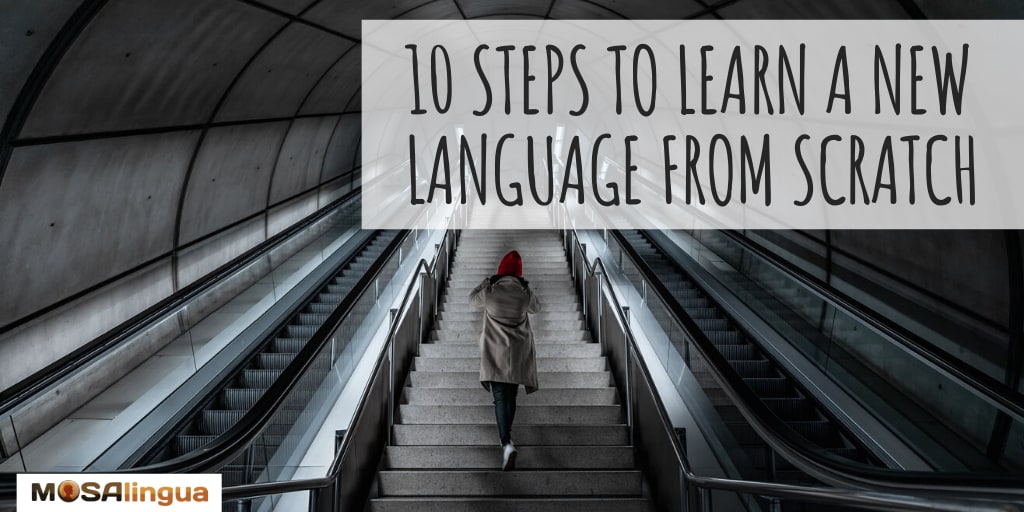So you’ve decided to learn a new language? You must be so excited! Learning a new language from scratch can be fun and rewarding. But it’s also a big project. To make sure you stay on track and don’t get overwhelmed, you need a clear plan of attack. In today’s video, we share the method used by MosaLingua’s co-founder Luca when he learns a new language. By following these 10 steps to learn a new language, you’ll be able to reach a conversational level faster than you thought, and have lots of fun doing it.

If you’d prefer to listen to this article, head over to our MosaLingua Language Lab podcast:
Listen to “#35 – How To Learn A Language From Scratch” on Spreaker.
10 Steps to Learn a New Language (From Scratch)
Luca learned all the languages he speaks today on his own. So he knows a thing or two about the difficulties you’ll probably encounter before mastering your target language.
That being said, learning a language is also a very personal journey. So, you may need to personalize some of these steps — but they’re a great starting point.
-
Be clear about why you’re learning a new language
Ask yourself why you wanted to learn this particular language. There are a million good reasons, but it’s important that you identify the ones that speak to you and write them down. This way, if you encounter an obstacle — and trust us, you will! — then you can go back and be reminded of all the reasons you started in the first place.
Like any big project, you’ll need to identify and set objectives or goals. Maybe you just want to “survive” your next trip abroad, or perhaps you’d like to learn to speak fluently. In his video on how long it takes to learn a language, Luca told us that the nature of your goal can have a big effect on your learning journey. So this is a really important first step.
2. Be S.M.A.R.T.
Another tip is having lots of little goals that you can check off one after the other in a short period of time. Luca’s favorite “micro-goal” when he starts learning a new language from nothing is to memorize the 300 most common words, by learning just 10 new words each day.
This is what we call a S.M.A.R.T. goal: It’s Small, Measurable, Achievable, Relevant and Time-sensitive.
3. Choose your main language learning tools
There are lots of different tools out there to help you achieve your goals. We all learn differently, so you’ll need to choose your own language toolbox carefully. Here’s our suggestion: choose tools that are
- effective, so you make the best use of your limited time; and
- that appeal to you, so that you’ll actually enjoy the process.
4. Start learning useful words and phrases
After these first crucial steps for learning a new language, you can get started learning the basics of your new language by memorizing simple and common words and expressions. These are the building-blocks of any language, so they’re the right place to start.
Luca has two tips for this step:
-
Start with a small amount of vocabulary: focus on the 20% that will let you get by in 80% of situations.
-
Learn the correction pronunciation from the start to avoid developing any bad habits, which can be really tough to break!
5. Get familiar with the language
When you start learning a brand new language, it’s like getting to know a stranger. But soon, it will be part of your life, for months or even years. So familiarize yourself with your new language as soon as possible, by listening to audio recordings like podcasts, and watching films and TV shows. Even if you don’t understand everything (or much of anything!), this early exposure is important for building your relationship with your new language. Although we don’t usually promote “passive listening,” it can actually be really useful in the beginning stages.
6. Practice every single day to develop a habit
Don’t just rely on willpower to learn a new language! Instead, give yourself a hand by building habits. Commit yourself to studying the language every day for at least 30 days — even if it’s just 10 minutes. And be sure you don’t miss a day, especially at the beginning. To do this, try to plan your study session at the same time each day, preferably in the morning when your brain is well-rested and fresh. Finally, book those time slots in your calendar, so it feels more like a serious commitment.
7. Listen, listen and listen some more!
You need thousands and thousands of hours of exposure to a new language if you want to master it. In his book “Outliers,” Malcolm Gladwell writes about the famous 10,000-hour rule: this is the amount of time it takes to master a skill and become an expert on a given subject. But the good news is that, unless you want to become an interpreter or a language professor, or talk like a native speaker, you won’t need nearly as long to be able to just carry on a conversation.
That being said, the magic words are listen, listen and listen some more! You need to get exposure to the language for at least 10 minutes per day. And at the beginning, we recommend closer to 30 minutes daily if you want to make rapid progress. Try to plan some time each day when you can immerse yourself in the language.
8. The internet is your best friend
There’s a whole wide world (web) of resources out there, and many of them are available for free. When it comes to learning a new language, the internet is your best friend. At MosaLingua, we try to provide you with as many amazing resources as we can, but don’t be afraid to go looking for them on your own. You can read, watch, listen, and even find conversation partners and communities, all online.
9. Schedule conversations
Luca dedicated a whole video to the question of when you should have your first conversation. It’s different for everybody, but for a language that’s relatively similar to your own, aim to start having your first conversations within 3 months. And once you start, keep that momentum going! Ideally, try to have at least one conversation per week with a tutor or language partner. If you can’t, twice per month is still good. Just make sure you’re practicing speaking out loud and having conversations as often as you can.
10. Have fun!
Last and definitely not least — have fun. You’re going to be spending a lot of time with your new language, so make sure you enjoy the resources you’re using to learn it. Movies, TV shows, comic books, anything you can think of that you can enjoy in your new language, make use of it. This way, learning your new language will be exciting, rather than boring, and you’ll have an easier time staying motivated. As we’ve already mentioned, there’s lots of learning material out there, and you can choose whatever kinds you like best.
Thanks to these 10 steps to learn a new language from scratch, MosaLingua’s co-founder Luca now speaks eight languages, so you can put faith in his method. That being said, we definitely encourage everybody to adapt these steps to better suit your goals, availability or learning style — but try not to skip any of them. They’ll help you learn a new language from scratch in a fun, efficient and effective way.
Bonus Steps to Learn a New Language: Watch This Video!
Abbe, our English teacher, goes over the steps Luca uses to learn a new language in this video from our YouTube channel. It’s in English, but you can turn on subtitles in the language of your choice. You can also slow down the playback speed by clicking on the settings button in the bottom-right of the video (it looks like a gear).
And don’t forget to subscribe to our YouTube channel for more great tips and videos!
Related posts:
Want to start improving your language skills today?
Start learning a new language today

Good news: we can help!
More good news: you can get started for free! Start your free trial now and for the next 15 days, take advantage of the most effective language learning method on the market!
Vocabulary flashcards, videos with subtitles, audiobooks, articles adapted to your level – with MosaLingua Premium (Web & Mobile), you’ll have access to all this and more. Get started right now. It’s free—and risk-free—to try!




Comments